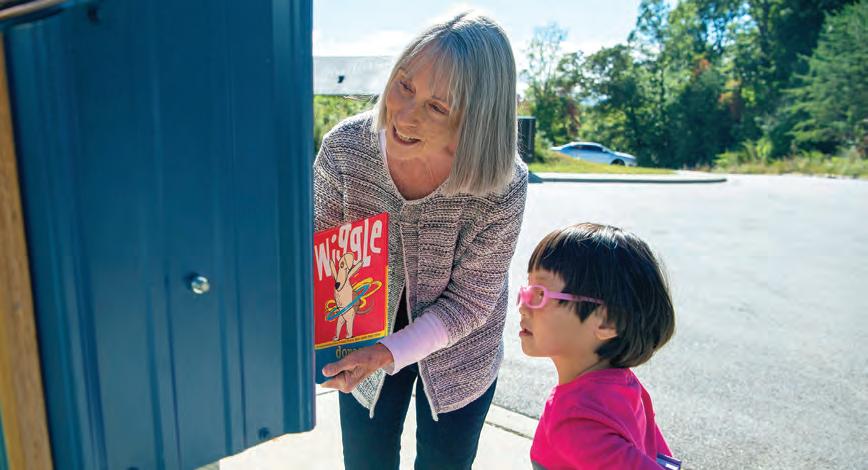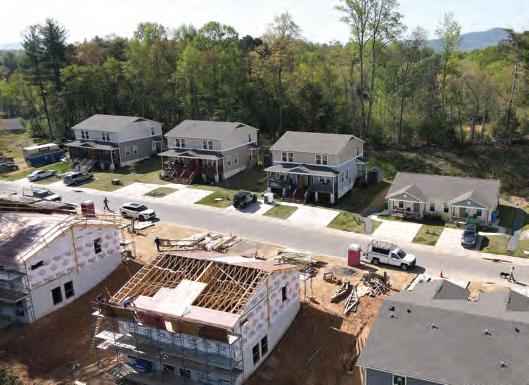
5 minute read
Building for Everyone
Asheville Habitat Adapts to Changing Housing Needs
BY ARIANE KJELLQUIST
Adapting to a community’s changing housing needs is critical for a non-profit focused on ensuring everyone has a decent place to call home. As land costs soar, the population ages, affordable rentals remain scarce, residents leave in search of cheaper housing options, and historically Black neighborhoods are re-developed, Asheville Area Habitat for Humanity (AAHH) has responded with new products and programs to address evolving needs and help increase access to stable and affordable housing.
In 2010, we introduced an affordable Home Repair program that preserves the character, affordability and diversity in our community and allows long-time residents to stay in their most affordable option — the home they already own, and avoid being priced out of the community they know and love. Our affordable repair program makes it possible for homeowners to complete repairs that had financially been out of reach. We fix leaky roofs, install ramps and replace heating systems for a low one-time fee, enabling existing homeowners to live more safely, comfortably and with dignity. Asheville Habitat’s average repair job costs $7,000 to complete, for which the homeowner pays a small amount. The average homeowner Partner Fee is $190, or 10% of their average monthly income. The fee is waived for repair jobs with a scope of work worth less than $1,500. Today, 75% of the families served through Asheville Habitat are repair clients. For decades, AAHH, along with most Habitats around the country, only built Arts & Crafts-style detached single-family homes. In 2019, Asheville Habitat successfully introduced two-story town- to many families, and the units offer less yard to maintain while still providing some outdoor space.
The organization’s largest and most ambitious neighborhood todate, New Heights in West Asheville, has taken product diversification even further. This multi-
Aging in Place (AIP) units, singlelevel townhomes specifically designed for adults age 55+ and made possible with generous support from local retirement community Deerfield and its Charitable Foundation. Older adults comprise 21% of Buncombe homes in a small community in Candler. Now a mainstay in current and future developments, this housing type enables Habitat to serve more families on the available land. For homebuyers, the 2and 3- bedroom townhomes offer slightly more square footage than their single-family counterparts, the multi-floor layout is desirable generational community includes detached single-family homes, two-story townhomes, single-level townhomes specifically designed for aging adults (55+), and walkout townhomes. Upon completion, 98 households of all ages, stages of life, and backgrounds will call this community home.

Eight homes in New Heights are
County’s population but have limited access to affordable housing options designed to meet their needs. “Every time I had an increase in income, there was a greater increase in the cost of housing. I had pretty much given up hope that I would ever be able to buy a house… I saw this program as a way to age in place in a safe community with safe and decent housing,” shared Kay Ponder, a first-time homebuyer at age 60.
Habitat brought together a group of stakeholders including experts in Universal Design and elder care to identify key elements and develop a product that would suit the needs of aging adults. Then TightLines Designs, an architectural firm out of Raleigh, designed the 744-square—foot AIP units using eco-friendly building systems which helps make this housing model an affordable and sustainable housing solution for the homeowners.
Asheville Habitat’s AIP model was recently recognized as “2023 Best in Accessibility” in Habitat for Humanity International’s 2023 Housing Design Contest. Each unit is one-level living that includes a full bath, kitchen, laundry, living space and 1-bedroom, as well as a bonus living space in the front of the home that if needed, could be closed off in the future for an inhome caregiver. These units are built on a slab rather than a crawlspace, which guarantees an atgrade or ramped entrance to the main floor, as well as a ½-inch maximum threshold between porches and finished floor of living units. All doors and openings are 36-inches wide and each hallway is 44-inches wide. Each unit has a bathroom that will accommodate a wheelchair within a 5-inch radius circle and a roll-in shower. Lever door handles are installed rather than the traditional knob styles, making it easier for aging hands to grasp.
Like all Asheville Habitat houses, these homes are Green Built Home certified, a program administered by Green Built Alliance. In fact, the AIP units are the most energy-efficient of all the models built by Asheville Habitat today. Construction Administrator


Sumaya El-Attar shared, “One of the main differences between AAHH’s other house models and the AIP model is that this unit is heated and cooled by a ductless Mini Split system, rather than a conventional heat pump. This method of heating and cooling is a space saver for such a small footprint. As with AAHH’s other housing models, an HRV (Heat Recovery Ventilating Unit) is used to balance the indoor ventilation, while removing excess moisture.” She added, “To date, the AIP unit has been the only AAHH model to achieve gold level Green Built Home certification.”
Across the street from the AIP units is another new housing model, walk-out townhomes. A common challenge to builders in the Blue Ridge Mountains is steep terrain. Seeking a sustainable building approach to serve more families, Asheville Habitat asked Robin Raines, of Rowhouse Architects, to modify a current twostory townhome design to fit the mountainous landscape. In the revised design, the main living level is accessible from the street, and the bedrooms are located on the lower level. The house is built on a slab at grade and eliminates the need for a crawlspace. El-Attar said, “Rowhouse’s design resulted in reduced cost of grading and lessened the environmental impact, while giving these townhomes a vernacular cottage-style aesthetic.”
In addition to expanding products, the organization has expanded its geographic service area. Asheville Area Habitat for Humanity and Madison County Habitat for Humanity joined forces to strengthen Habitat for Humanity in our region. As a combined organization serving Buncombe and Madison Counties, more families will be served with life-changing homeownership and home repair programs in the coming years.
Furthermore, Asheville Habitat regularly reviews policies and when possible, makes changes to eliminate or reduce barriers. For example, more low-income homeowners were able to afford home repair when the pricing policy changed from a sliding scale to a one-time low fee. Asheville Habitat also advocates for inclusive housing policies and programs at the local and state level, as advocacy is an important tool for ensuring everyone has access to de-
*Housing Needs AssessmentWNC (2021) estimates the need for additional for sale housing units affordable to households cent housing.
<80% AMI in Madison and Buncombe Counties at 1,770 homes. American Housing Survey estimates 3% of all U.S. owner-occupied housing units have moderate to severe quality deficits. This equates to 6,114 units homes in need of repair in Madison and Buncombe counties.
With four decades of experience, today’s diverse product portfolio, and a vision for the future, Asheville Habitat is well-positioned to serve our region’s affordable housing needs. Between 2018 and 2028, the organization will serve 1,000 families, addressing 10% of our region’s affordable homeownership and repair needs.* A key factor in achieving this goal will be continued adaptability. “We don’t know what the next iteration of innovation looks like yet, but we know we’ll continue to adapt our programs and products to ensure more neighbors have access to stable, affordable housing,” concluded Andy Barnett, Executive Director.
Ariane Kjellquist is the communications director for Asheville Area Habitat for Humanity. She has worked since 2006 for the local nonprofit, which builds and repairs homes, operates two ReStores and a deconstruction service, and advocates for inclusive housing policies. Connect with Ariane at ashevillehabitat.org.










